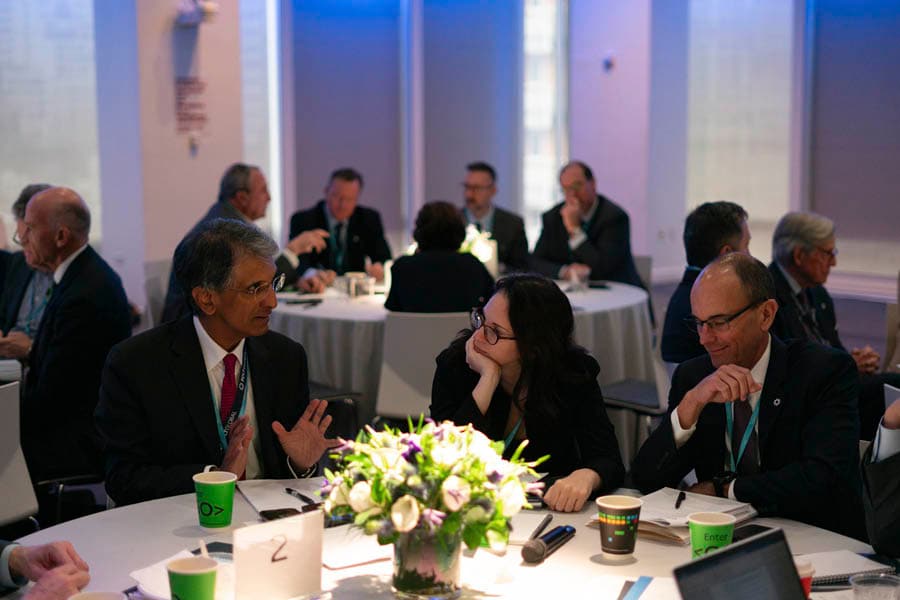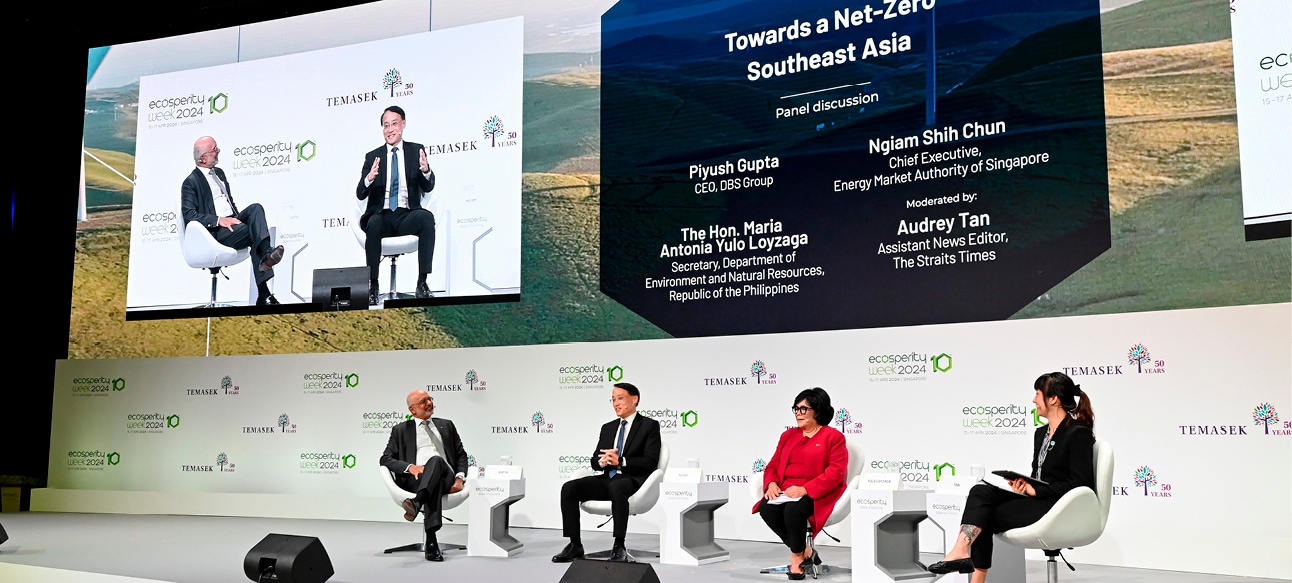Driving Partnerships for Change
Proactive and committed collaboration can drive systemic changes required to solve sustainability challenges. Governments, corporations, and investors must work together on transition roadmaps and promote adoption of new solutions, due to the urgency, scale, and cross-disciplinary nature of the necessary transitions.
Institutional Partnerships
To create the impact and speed of change needed for all people to live well within planetary boundaries by 2050, collaboration at unprecedented levels will be of essence. Temasek actively engages and participates in a wide range of local, regional, and global initiatives on sustainability-related topics to advance industry standards and best practices, catalyse solutions, or shape new markets.
For example, as a convening member of the Singapore Sustainable Finance Association, which was launched in January 2024, we contribute to advancing frameworks and industry best practices for carbon markets, transition finance, blended finance, natural capital and biodiversity, and taxonomy. To support the harmonisation and advancement of sustainability disclosure standards, we contribute to the Sustainability Reporting Advisory Committee established by the Accounting and Corporate Regulatory Authority and Singapore Exchange Regulation, and the Investor Advisory Group of the International Sustainability Standards Board (ISSB). As a member of the Global Impact Investing Network (GIIN) and a founding strategic partner to the Impact Lab by GIIN, we work to drive a deeper understanding of impact performance, risk, and financial return.
Our participation in various topical platforms of the World Economic Forum and in the Focusing Capital on the Long Term (FCLT) Initiative allows us to contribute to multi-stakeholder dialogues on the solutions required to enable broader system changes. We also continue to engage various global industry groups that drive the transformation of the financial industry towards sustainability, including the Glasgow Financial Alliance for Net Zero, the UN-convened Net-Zero Asset Owner Alliance, Principles for Responsible Investment, and others.
The energy transition gives rise to new industries and markets, such as hydrogen and carbon markets. We participate in relevant platforms such as the Hydrogen Council and the Integrity Council for the Voluntary Carbon Market to stay abreast of the developments, contribute our perspective, and connect with stakeholders along the value chain to identify opportunities to accelerate and scale solutions required on our journey to decarbonise our economies.
Beyond Temasek’s participation in these initiatives, our staff also advance sustainability leadership through participation in sustainability-related committees and working groups in various industry associations, professional bodies, and platforms, such as the Institute of Singapore Chartered Accountants, the International Institute for the Unification of Private Law, the International Swaps and Derivatives Association, the Singapore Institute of Directors, and the Singapore Venture and Private Capital Association.

Dilhan in conversation at the annual FCLT Summit 2024 which brought together FCLTGlobal members and friends.
Collaborating to Accelerate Sustainable and Transition Finance
Asia accounts for more than half of global carbon emissions. It is still heavily dependent on fossil fuels for its economic development and energy needs. In addition to the significant amount of upfront capital required to transition Asia towards a greener economy, socioeconomic goals must also be considered in the transition process. Mobilising capital to bridge financing gaps and drive investments into sectors with infrastructure at varying maturity stages is key to accelerating decarbonisation, and enabling a just and inclusive transition.
Our ability to deploy capital flexibly has enabled us to look beyond traditional financing approaches. Alongside other partners, we strive to address climate financing gaps with varied and innovative solutions. These include blended and/or transition finance mechanisms that can better support the development and scaling of sustainable infrastructure.
1 FTSE, Investing in the green economy 2022, May 2022
Clifford Capital Holdings is one of our platform companies providing debt financing solutions for the infrastructure and maritime sectors. It is committed to sustainable growth and net zero financed emissions by 2050. It has structured and issued three project and infrastructure debt securitisation transactions for eligible green and social loans since its first issuance in 2018, with its most recent issuance in September 2023.
Pentagreen Capital, our joint venture with HSBC, has started to catalyse financing for sustainable infrastructure projects in Asia. It signed its first transaction with Philippines-based solar development company Citicore Solar Energy Corporation, structuring a US$100 million mezzanine construction green loan with an initial tranche of US$30 million. The initial tranche supports a portfolio of six solar projects in the Philippines and is expected to enable more than US$300 million in total project capital value. The transaction reflects Pentagreen’s potential as a specialised lender to remove barriers to bankability.
Our collaboration with Allied Climate Partners, International Finance Corporation, and the Monetary Authority of Singapore (MAS) to establish the Green Investments Partnership is a reflection of our efforts to expand the financing toolbox. The partnership aims to increase the bankability of green and sustainable projects in Asia, with an initial focus on Southeast Asia. This is part of MAS’ Financing Asia’s Transition Partnership (FAST-P), a Singapore blended finance initiative in collaboration with key public, private, and philanthropic sector partners that aims to mobilise up to US$5 billion to de-risk and finance transition and marginally bankable green projects in Asia.
Beyond partnerships to deploy capital, we continued to support whole-of-system efforts and approaches by contributing actively to various sustainability-related initiatives and engagements to advance sustainability leadership and drive progress.
We joined the Transition Credits Coalition (TRACTION) as a knowledge partner to further explore transition financing mechanisms that can improve the economic viability of financing the early retirement of coal-fired power plants. Launched by MAS, TRACTION seeks to identify system-wide barriers by studying the challenges and developing solutions for transition credits to be utilised as a complementary and credible financing instrument. We will contribute our expertise, insights, and network to support the deliberations and any related pilots.
We also participated in the World Bank Private Sector Investment Lab, in a collaborative effort to address the barriers to private sector investment in emerging markets, with an initial focus on scaling transition financing in renewable energy and energy infrastructure. By contributing our investor perspectives, we support the growing momentum and increasing level of commitment for the public and private sectors to come together to address global challenges and contribute to ideas for improved financing structures, approaches to balancing and allocating risks across investors, and reimagine new partnerships.
There is an urgent imperative to bridge the capabilities gap in climate tech innovation in Southeast Asia. To address this, we partnered Breakthrough Energy and Enterprise Singapore to establish Breakthrough Energy Fellows – Southeast Asia. This Singapore-based programme is the first Breakthrough Energy Fellows hub outside of the US. It will provide climate tech innovators with the catalytic funding and support needed to develop, commercialise, and scale promising climate solutions.
Arayat Solar Farm in Philippines, developed by AC Energy and Citicore.
To reach net zero, greening the economy is as important, if not more important than growing the green economy. Sustainable and transition finance are key levers to accelerate the green economy transition. But they will require more radical innovations and deeper collaborations amongst governments, corporations, and investors.


